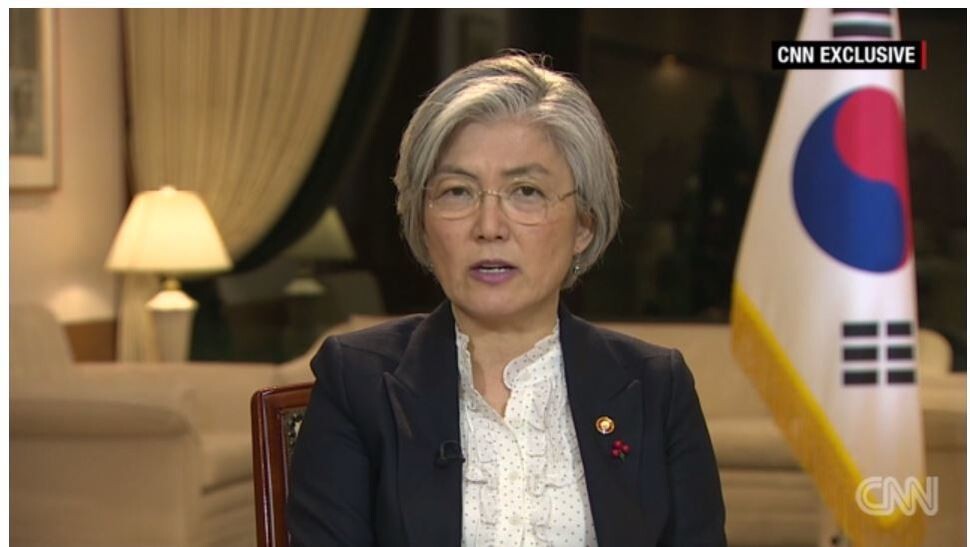hankyoreh
Links to other country sites 다른 나라 사이트 링크
SK Foreign Minister set to make first visit to Japan

Minister of Foreign Affairs Kang Kyung-wha is planning a visit to Japan on Dec. 19-20, her first since taking office. Kang’s visit suggests the Moon Jae-in administration is launching an effort to improve ties with Japan, the only one of the “four major powers” (including the US, China, and Russia) it has yet to begin mending fences with. But it is unclear for now whether the visit will lead to an improvement in bilateral relations, coming as it does ahead of the scheduled late-December publication of a task force report examining an agreement reached by Seoul and Tokyo on the Japanese military comfort women issue on Dec. 28, 2015.
The Ministry of Foreign Affairs announced on Dec. 17 that Kang and her Japanese counterpart Taro Kono would be “exchanging opinions on areas of mutual interest at South Korea-Japan foreign minister talks on the afternoon of Dec. 19, with a particular focus on South Korea-Japan relations, North Korea, and the North Korean nuclear issue.”
Previously, hopes for improvement in South Korea-Japan relations were raised by Moon’s “two-track approach” addressing the comfort women and other historical issues separately from other areas, along with his agreement to restore “shuttle diplomacy” at a July summit with Japanese Prime Minister Shinzo Abe. But the two sides have failed to make much progress since Seoul’s late July launch of a task force re-examining the process and content of the Dec. 2015 intergovernmental agreement on the comfort women issue.
Both sides have put off the practical normalization of relations: the Moon administration as it waits to examine the report before reaching an official position on the agreement, and the Japanese government as it continues observing Seoul’s actions and calling on it to honor the existing agreement.
Discussions on the task force’s review findings appear likely to be the main focus of the foreign minister talks as well. The task force is seen as likely to raise issues with the agreement such as the failure to reflect the actual comfort women survivors’ views during the negotiation progress; Japan is expected to raise objections.
“With the inclusion of a negative assessment of the comfort women agreement [in the task force report] a seeming inevitability, another chill in South Korea-Japan diplomatic relations appears unavoidable,” the Asahi Shimbun newspaper predicted.
“During her Japan visit, Kang is expected to survey Japan’s response before reaching a final conclusion on [Seoul’s] handling of the comfort women agreement,” it said.
Kang is expected to give another explanation during the talks on the Moon administration’s “two-track approach,” while stressing that the task force’s findings will not immediately become administration policy. With signals that Tokyo will reiterate its calls to implement the existing agreement, some are predicting relations are unlikely to improve for the time being regardless of the Moon administration’s intentions.
“It doesn’t look as though South Korea-Japan relations are going to dramatically implode, but Japan could increase pressure on South Korea by prioritizing its relationship with China,” said Waseda University professor Lee Jong-won.
“There’s also a chance [of Japan using] a visit by Prime Minister Abe around the time of the Pyeongchang Olympics opening ceremony as a pressure tactic,” Lee predicted.
The possibility of Abe visiting for the Olympics is expected to be a topic of discussion during the talks, along with a possible trilateral summit with China in January. The two sides also plan to discuss coordination in response to North Korea’s Nov. 29 test-launch of the Hwasong-15 ICBM and declaration of its “completion of state nuclear armament.”
By Kim Ji-eun, staff reporter and Cho Ki-weon, Tokyo correspondent
Please direct questions or comments to [english@hani.co.kr]

Editorial・opinion
![[Editorial] Does Yoon think the Korean public is wrong? [Editorial] Does Yoon think the Korean public is wrong?](https://flexible.img.hani.co.kr/flexible/normal/500/300/imgdb/original/2024/0417/8517133419684774.jpg) [Editorial] Does Yoon think the Korean public is wrong?
[Editorial] Does Yoon think the Korean public is wrong?![[Editorial] As it bolsters its alliance with US, Japan must be accountable for past [Editorial] As it bolsters its alliance with US, Japan must be accountable for past](https://flexible.img.hani.co.kr/flexible/normal/500/300/imgdb/original/2024/0417/6817133413968321.jpg) [Editorial] As it bolsters its alliance with US, Japan must be accountable for past
[Editorial] As it bolsters its alliance with US, Japan must be accountable for past- [Guest essay] Amending the Constitution is Yoon’s key to leaving office in public’s good graces
- [Editorial] 10 years on, lessons of Sewol tragedy must never be forgotten
- [Column] A death blow to Korea’s prosecutor politics
- [Correspondent’s column] The US and the end of Japanese pacifism
- [Guest essay] How Korea turned its trainee doctors into monsters
- [Guest essay] As someone who helped forge Seoul-Moscow ties, their status today troubles me
- [Editorial] Koreans sent a loud and clear message to Yoon
- [Column] In Korea’s midterm elections, it’s time for accountability
Most viewed articles
- 1[Column] The clock is ticking for Korea’s first lady
- 2[Editorial] When the choice is kids or career, Korea will never overcome birth rate woes
- 3[Guest essay] How Korea turned its trainee doctors into monsters
- 4[Editorial] As it bolsters its alliance with US, Japan must be accountable for past
- 5S. Korea, Japan reaffirm commitment to strengthening trilateral ties with US
- 6Korea, Japan jointly vow response to FX volatility as currencies tumble
- 7Gangnam murderer says he killed “because women have always ignored me”
- 8Japan officially says compensation of Korean forced laborers isn’t its responsibility
- 9[News analysis] After elections, prosecutorial reform will likely make legislative agenda
- 10‘Right direction’: After judgment day from voters, Yoon shrugs off calls for change